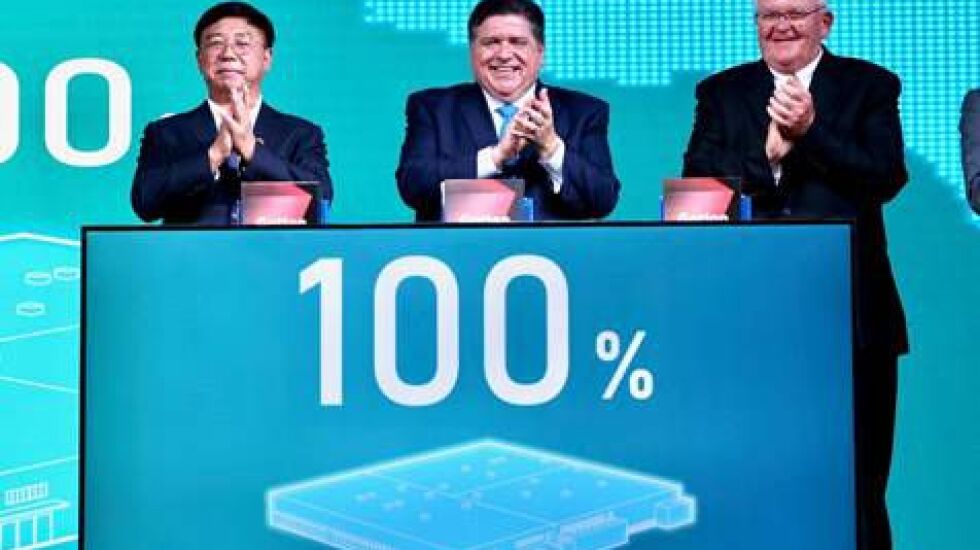
A Chinese battery maker’s decision to open an electric vehicle battery plant in Kankakee County is a huge victory in Gov. J.B. Pritzker’s all-out bid to bring more Asian companies to Illinois.
It’s also part of a larger effort. Pritzker and U.S. Sen. Tammy Duckworth are trying to seal deals with Asian companies — the governor through a direct line of communication with business heads, and Duckworth with two Asian trips under her belt this year to try to encourage cooperation and agreements.
“There’s a lot of complexity to these deals, and I guess I’m constantly trying to stay on top of that, and then intervening when I think it’s a moment when there’s risk,” Pritzker told the Sun-Times of the deal.
Gotion announced on Friday plans for a $2 billion lithium battery plant in Manteno on the site of a former Kmart, a factory that should create 2,600 jobs. The plant will be built with the help of an Illinois tax incentive called Reimagining Energy and Vehicles, or REV, that also specifies a minimum company investment of $1.9 billion.
Gotion High-Tech Co., whose majority owner is Volkswagen, will also be the first company to receive money from Invest in Illinois, a closing fund cleared by lawmakers in the spring that will give the company $125 million in capital.
The fund, aimed at making Illinois more attractive when vying for big projects, includes a clawback provision if the company does not meet certain requirements. In total, the incentive package Gotion received is valued at $536 million.
It was the tax incentives, the closing fund and persistence that sealed the deal and helped him beat out Ohio and Alabama, the governor said in an interview Friday. Pritzker said there’s a “pipeline of opportunities” at various stages that the state is targeting in the fields of manufacturing, financial services, biotech and agriculture.
Pritzker said his team “persistently kept in communication” with Gotion — and the governor jumped in for certain checkpoints, about once every two months, including a conversation with Li Zhen, the chairman of Gotion, in December 2022. His pitch included an assurance that the state won’t abandon Gotion after landing the deal and breaking ground.
“I was a businessman before I was governor, and I have a pretty good idea how to talk to international partners,” Pritzker said. “And so it was the kind of mutual respect that I think we showed each other, and in particular, our team had a great deal of respect for their culture and understanding for what their concerns might be about coming to any state in the United States.”
The governor said he is open to tweaking incentives to lure companies to Illinois, but touted that the state has a “pretty good program right now.” Gotion is the fifth company to use the REV tax credit, which began two years ago.
With electric vehicle sales increasing in Illinois, the state could eventually reach a point where it is not taking in enough motor fuel tax revenue. But the governor downplayed that concern, saying, “It’s something that we should keep an eye on,” but it’s “not something that’s reached an urgent need yet.”
As for the governor’s familiarity with electric vehicles, Pritzker said his wife, first lady M.K. Pritzker, owns a Rivian truck at their Wisconsin farm, and his son, Donny, learned how to drive with it. And while he is now being driven by security in large black SUVs, he said, “As my security team knows, I would prefer to drive.”
‘The energy piece is really an advantage’
Duckworth’s own push to get more Asian companies to do business with Illinois included a personal pitch last month to Ferdinand Marcos Jr., the president of the Philippines, to use Illinois-based ethanol, which is made mostly from corn. She’s also been traveling with members of the Illinois Corn Growers Association, touting that the expansion of ethanol will not only help Illinois corn farmers but reduce carbon emissions and the demand on foreign oil.
The senator said Illinois’ clean energy work — its production of corn ethanol and use of underground carbon pools — are also of interest to companies seeking to lower their carbon emissions.
“The energy piece is really an advantage Illinois has that people have overlooked for a very long time,” Duckworth said. “And it is something that is very, very, very attractive to these companies, these multinational corporations when they’re looking around.”
Duckworth, who joined the U.S. Senate Foreign Relations Committee in January, returned last month from the Indo-Pacific region, visiting Thailand, Indonesia and the Philippines. In February she led a trip to Japan, where she also vouched for Illinois ethanol.
Just as Pritzker is calling business leaders, Duckworth said she has spoken to Panasonic about opening an electric vehicle plant in Belleville.
She’s also been dispelling some anti-union sentiment, including in discussions with LG Chem, a Korean chemical company that announced a joint venture last year with nutrition company ADM to make plant-based products, including bioplastics.
“I’ve been working very hard to counter that and say, ‘Here’s the data. Look at the productivity, and in fact, the unions are your friends. The unions can do things like mandatory drug testing and can be partners with management and to bring the most well-trained, the most productive workers to the table,’” Duckworth said. “And LG ended up going into Decatur.”







